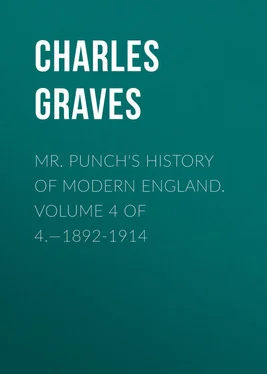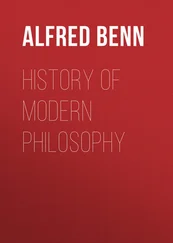Charles Graves - Mr. Punch's History of Modern England. Volume 4 of 4.—1892-1914
Здесь есть возможность читать онлайн «Charles Graves - Mr. Punch's History of Modern England. Volume 4 of 4.—1892-1914» — ознакомительный отрывок электронной книги совершенно бесплатно, а после прочтения отрывка купить полную версию. В некоторых случаях можно слушать аудио, скачать через торрент в формате fb2 и присутствует краткое содержание. ISBN: , Издательство: Иностранный паблик, Жанр: foreign_prose, foreign_humor, на английском языке. Описание произведения, (предисловие) а так же отзывы посетителей доступны на портале библиотеки ЛибКат.
- Название:Mr. Punch's History of Modern England. Volume 4 of 4.—1892-1914
- Автор:
- Издательство:Иностранный паблик
- Жанр:
- Год:неизвестен
- ISBN:http://www.gutenberg.org/ebooks/48405
- Рейтинг книги:5 / 5. Голосов: 1
-
Избранное:Добавить в избранное
- Отзывы:
-
Ваша оценка:
- 100
- 1
- 2
- 3
- 4
- 5
Mr. Punch's History of Modern England. Volume 4 of 4.—1892-1914: краткое содержание, описание и аннотация
Предлагаем к чтению аннотацию, описание, краткое содержание или предисловие (зависит от того, что написал сам автор книги «Mr. Punch's History of Modern England. Volume 4 of 4.—1892-1914»). Если вы не нашли необходимую информацию о книге — напишите в комментариях, мы постараемся отыскать её.
Mr. Punch's History of Modern England. Volume 4 of 4.—1892-1914 — читать онлайн ознакомительный отрывок
Ниже представлен текст книги, разбитый по страницам. Система сохранения места последней прочитанной страницы, позволяет с удобством читать онлайн бесплатно книгу «Mr. Punch's History of Modern England. Volume 4 of 4.—1892-1914», без необходимости каждый раз заново искать на чём Вы остановились. Поставьте закладку, и сможете в любой момент перейти на страницу, на которой закончили чтение.
Интервал:
Закладка:
Charles L. Graves
Mr. Punch's History of Modern England, Vol. 4 (of 4).—1892-1914
PART I
THE PASSING OF THE OLD ORDER
HIGH POLITICS
Transition and growth, change and decay and reconstruction marked the half-century covered in the previous three volumes. In the twenty-two years that divide the return of the Liberals in 1892 from the "Grand Smash" (as Mr. Page has called it) of 1914, these features are intensified to an extent that renders the task of attempting even a superficial survey perilous and intractable to one who is neither a philosopher nor a trained historian. The wisest and sanest of those who have lived through these wonderful times are too near their heights and depths to view them in true perspective. Whatever merit attaches to this chronicle is due to its reliance on contemporary opinion as expressed in the pages of an organ of independent middle-class views. It is within these limits a history of Victorians and post-Victorians written by themselves.
"Full closes," unfashionable in modern music, are generally artificial in histories. But the period on which we now enter did more than merely coincide with the end of one century and the beginning of another. It marked the passing of the Old Order, the passing of the Victorian age: of the Queen, who, alike in her virtues and limitations, in the strength and narrowness of her personality, epitomized most of its qualities; and of the type of Elder Statesmen, of whom, with the sole exception of Mr. Balfour, none remains at the moment as an active force in the political arena. Of the Ministry of 1892-5 the only survivor who mixes in practical politics is Mr. Asquith, but his record as a legislator hardly entitles him to the name of an Elder Statesman in the Victorian sense. Sir George Trevelyan, Lord Morley, Lord Eversley and Lord Rosebery have all retired into seclusion. So, too, with the Unionist Ministers who held office from 1895 to 1905. Veterans such as Lord Chaplin, Lord George Hamilton and Lord Lansdowne enjoy respect, but they do not sway public opinion, and are debarred by age from active leadership and office. Lord Midleton stood aside to make way for younger men when the Coalition Government was formed, and Lord Selborne is perhaps the only Conservative statesman who held office before 1906 who has any chance of sitting in a future Cabinet.
It was not only an age of endings; it was also an age of beginnings, fresh and sometimes false starts, both as regards men and measures. It witnessed the coming of the Death Duties in 1894, when Sir William Harcourt's "Radical Budget," by equalizing the charges on real and personal property, paved the way for the more drastic legislation introduced by the Liberals in 1906 and the following years. This was Harcourt's greatest achievement, and perhaps the most notable effort in constructive policy of the short-lived Liberal administration; for the second Home Rule Bill was dropped on its rejection by the Peers. Under the Unionist administrations of 1895-1905 Mr. Joseph Chamberlain, as Colonial Secretary, and Mr. Wyndham, by his Irish Land Purchase Act, rendered conspicuous service in the domain of Imperial and Home policy. Yet at the culminating point of his popularity Mr. Chamberlain left the Government to prosecute that Fiscal Campaign which broke up the Government, broke down his strength, and ended a brilliant career in enforced retirement. Mr. Wyndham's withdrawal from the Government, owing to friction over Irish policy, closed in early middle age the career of the most gifted and attractive politician of his generation.
The enigmatic smile of this Old Master distinguishes it from that other National treasure, the "Bonar Lisa."
From 1906 onwards we are confronted by the meteoric and Protean personalities of Mr. Lloyd George and Mr. Winston Churchill, who between them have held almost all the great offices of State, and ranged over the whole spectrum of Party colours, and lastly of Lord Birkenhead. Mr. Churchill's father had once called Mr. Gladstone "an old man in a hurry." One wonders what Lord Randolph would have called his son Winston, of whom it was said "he likes things to happen, and when they don't happen he likes to make them happen." In comparison with the discreet progress of Reform in the last century the pace became fast and furious. The demands of organized Labour were conceded in the Trade Disputes Bill of 1906 – the greatest landmark in industrial legislation of the last half-century – and in 1910 the People's Budget led to the revolt and surrender of the House of Lords.
Yet concurrently with the democratic drift of Liberal finance and social reform, the principle of a continuity of foreign policy, initiated by Lord Rosebery, and continued by Lord Salisbury and Lord Lansdowne, was faithfully maintained by Sir Edward Grey, whose sober and frugal expositions contrasted strangely with the vivacity and flamboyant rhetoric of his colleagues. The Anglo-French Entente and the Anglo-Japanese Alliance both came into being when Lord Lansdowne was at the Foreign Office, and the influence of the Liberal Imperialist group in Sir Henry Campbell-Bannerman's Cabinet secured a free hand for the Foreign Minister. It is the fashion in some quarters to regard the late King Edward as "the only begetter" of the Entente ; it is at any rate within the mark to credit him with having missed no opportunity of fostering it by his tact and bonhomie . It was no easy task. When he visited Paris in 1902 the official greetings were perfectly correct, but the animosity aroused over the Boer war found vent in outrageous and unseemly caricatures. England was then the most unpopular country in the world; and in allaying this general distrust and dislike, the personal relations of King Edward with foreign statesmen and rulers wrought powerfully for goodwill and a better understanding.
Mr. F. E. Smith: "Master of epigram – like me!"
Mr. Winston Churchill: "Wrote a novel in his youth – like me!"
Together: "Travelled in the East – like us. How does it end?"
(Mr. W. F. Monypenny's official "Life of Disraeli" has just been published.)
Foes and Friends
Looking back, in the light of fuller knowledge, on the South African war of 1899-1902, we cannot fail to recognize how narrowly we escaped the active hostility of more than one European Power; how much we owe to the wise magnanimity of the British Government in granting full autonomy to the Transvaal in 1906 – an act not only justified by the sequel but approved by those who voted against it. It converted the most formidable of those who fought against us into loyal servants of the Empire in her hour of greatest need; it allayed the misgivings of those at home who had opposed the Boer war, and it silenced the criticisms of foreigners who had denounced our aim as the extermination of a people rightly struggling to be free. Whatever views may be held as to the origin of the Boer war – that it was forced on by mining magnates, or that it was the inevitable result of a reactionary system which threatened our hold on South Africa – it remains one of the very few examples of a war which, in the long run, left things better than they had been, and satisfied the aspirations of the majority of the conquered. And if we did not learn all the lessons that we might have learned from the military point of view, the experience was not thrown away. The services of Kitchener, Plumer and Byng, to mention only three out of scores of names, proved that what was comparatively a little war was a true school of leadership for the greatest of all.
Great Britain's warlike operations throughout this period were intra-Imperial, and the scale of the South African campaign, in which from first to last we put 250,000 men into the field, dwarfed the troubles in Ashanti and on the Indian frontier into insignificance.
Читать дальшеИнтервал:
Закладка:
Похожие книги на «Mr. Punch's History of Modern England. Volume 4 of 4.—1892-1914»
Представляем Вашему вниманию похожие книги на «Mr. Punch's History of Modern England. Volume 4 of 4.—1892-1914» списком для выбора. Мы отобрали схожую по названию и смыслу литературу в надежде предоставить читателям больше вариантов отыскать новые, интересные, ещё непрочитанные произведения.
Обсуждение, отзывы о книге «Mr. Punch's History of Modern England. Volume 4 of 4.—1892-1914» и просто собственные мнения читателей. Оставьте ваши комментарии, напишите, что Вы думаете о произведении, его смысле или главных героях. Укажите что конкретно понравилось, а что нет, и почему Вы так считаете.












